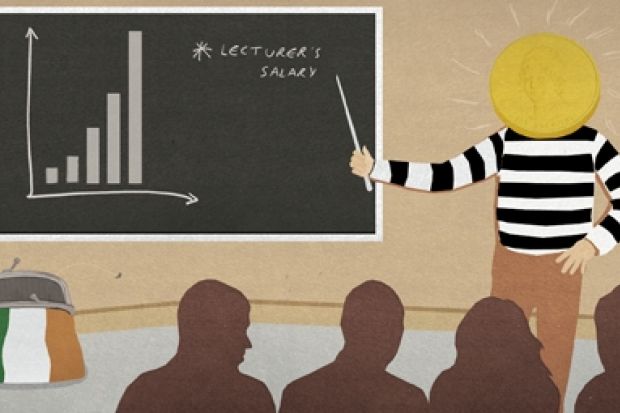The International Monetary Fund’s visit to Dublin has alarmed Europeans, who wonder whether the crisis may be repeated elsewhere. Ireland, until recently an international success story, has now become a salutary lesson for difficult times.
A variety of factors led to the Irish crisis. Its higher education system has not been mentioned as one of the culprits, but it still merits consideration. The financial crisis will force higher education, as in other countries, to make significant savings. It will also force it to consider whether it could have done things differently.
For starters, according to a draft of the National Strategy for Higher Education report, which has not yet been released, only 15 per cent of Ireland’s higher education spend comes from private sources. This figure is noticeably smaller than that of the European Union (19 per cent), the Organisation for Economic Cooperation and Development ( per cent), the UK (35 per cent) and the US (66 per cent). Its level of public spend on higher education is surpassed only by Norway, Denmark, Finland and Sweden, all relatively high-tax regimes – something that Ireland has moved away from.
If, therefore, its public purse continues to fund 85 per cent of its higher education spend, something else must give. That would mean student tuition fee increases, spending cuts, tax rises, greater efficiencies or some combination of these.
The internal arrangements in Irish higher education are similarly unsustainable. Salaries comprise three-quarters of the sector’s total spend, compared with two-thirds internationally. This leaves it with a relatively lower non-pay spend than is typical elsewhere.
And although public funding for the sector has fallen recently, enrolments have continued to rise – placing it under further pressure.
The system also features relatively high wages for academics and administrators – especially at senior levels. According to a survey by the Irish Times published last month, 497 people are on the professorial salary scale of €113,573 to €145,952 (£95,882 to £123,133), and more than 60 earn even more. This has brought envious glances from abroad and may explain some of the relocations of academics to Ireland.
The salary differentials are also striking. A run-of-the-mill faculty director in Ireland earns almost four times the basic assistant lecturer rate (€39,715). And some of the best paid earn five or six times that. Not long ago, at least one administrator at University College Dublin was paid more than 10 times this rate, €409,000, but this was recently cut to €263,602.
Ireland has about 40 higher education institutions. The smaller ones will now come under pressure to merge, and one of the carrots on offer may be the endowment of merged institutes with technological university status. One should always be wary of government gifts. Technological university status is either important in its own right or it is not; it should not become a negotiating carrot.
Since the banking meltdown and the property bubble collapse, the search has been on for culprits. The media’s main offender list includes property developers and bankers. However, it also includes the government, the regulatory authorities and senior public servants for not doing their jobs properly.
No one has mentioned the higher education system. And yet many of the inadvisable or unethical decisions taken in the higher reaches of property, banking and elsewhere were made by, or with the connivance of, people with high-calibre degrees.
One notable feature of the meltdown has been the unwise and in certain cases unethical decisions across the failed system. Ireland’s meltdown was much more than just a technical phenomenon – it was a human event built on decisions that were replete with responsibilities, judgements and values. These decisions provided the opportunity to display fairness, caution, care and kindness, but they also allowed the opposite behaviours, as well as lack of due procedure, unethical behaviour and, possibly, downright skulduggery.
Has Irish higher education done enough in focusing largely on its knowledge role and its contribution to the economy? Did it do the right thing in providing its excellent graduates with cutting-edge technology but little sense of values? And if not, has the Celtic meltdown exposed a fundamental flaw in higher education everywhere?
In the coming months, academics will inevitably focus on the cuts to their budgets and possibly to their salaries. This is not enough; serious soul-searching is in order.
Anto Kerins is a senior lecturer at the Dublin Institute of Technology and author of An Adventure in Service-Learning: Developing Knowledge, Values and Responsibility (2010).
Register to continue
Why register?
- Registration is free and only takes a moment
- Once registered, you can read 3 articles a month
- Sign up for our newsletter
Subscribe
Or subscribe for unlimited access to:
- Unlimited access to news, views, insights & reviews
- Digital editions
- Digital access to THE’s university and college rankings analysis
Already registered or a current subscriber? Login
